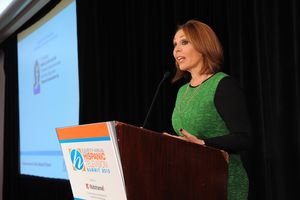Hispanic Television Summit: Salinas: An Impassioned Advocate
The smarter way to stay on top of the multichannel video marketplace. Sign up below.
You are now subscribed
Your newsletter sign-up was successful
New York -- At the 11th annual Hispanic Television Summit here on Oct. 2, Multichannel News and Broadcasting & Cable honored longtime Univision journalist and co-anchor Maria Elena Salinas with the Outstanding Achievement Award in Hispanic Television.
The following is an edited version of her speech during the awards luncheon at the New York Marriott Marquis, which followed a video tribute to the veteran newscaster..

I wasn’t expecting to see my daughters up there; that’s a tough one for me. My oldest daughter, you can tell, is in her dorm and she probably just woke up (laughter). It’s probably two o’clock in the afternoon. This is the first time we separate; she’s at college. It’s very special. Those of you have teen-aged kids know how difficult it is for them to say. ‘Mom, I’m proud of you.’
I’m really, really honored to be here, and getting this recognition for doing something I really, really love and have been doing for a long time. Thirty years. You can tell, my hairdos, different styles (laughter). It’s actually 32 years, but you know how people take off their age. Well, I’m trying to do that, to get you to think that I started when I was eight-year-olds (laughter). When I read the article that Laura Martinez so kindly wrote -- it was very, very nice -- one of the things that jumped out at me was the notion of advocacy journalism.
It’s something I’ve had to defend so many times and I don’t understand why I need to defend it, as if it were bad or immoral, as if it were unethical journalism. I have never seen it that way. As journalists, of course, our job is to seek the truth, to question those in power, to inform in an objective manner. Or should I say to be truly fair and balanced in our reporting. And I think that’s what we’ve done with Spanish-language communications and at Univision, I know we do that.
But we go beyond that, because our audience has additional needs. Yes, they care about what’s going on in their city, their state, in their country of origin if they’re immigrants, or their newly adopted country, which is here. So I learned very early on in my career that we had a very special audience with very special needs. And I knew my job was going to be different than those who worked in mainstream media.
Like many journalists, I learned by being out in the streets, covering stories and taking advantage of life lessons in the field. It was many years ago in the early '80s, covering a local election that the Latino community would have the first opportunity in decades to elect someone who would represent them, as a Latino. At that time, Latinos were 25% of the population in Los Angeles. When I went out to speak to the people on the street, out of the 16 people I interviewed, 15 of them weren’t voting. They weren’t voting because they were not citizens, or weren’t registered or because they didn’t know there was an election that day. I remember going back to my office and talking to my news director, Pete Moraga -- rest in peace, he taught me so many things -- and I said, ‘I can’t do this story, nobody’s voting.’ ‘Well, he said, ‘there’s your story, it’s right in front of you. Nobody’s voting because they’re so disenfranchised from the mainstream. They feel so disconnected that they’re not participating in the political process.’
The smarter way to stay on top of the multichannel video marketplace. Sign up below.
That was one of those 'ah, ha' moments, where I realized that it was a wake-up call. That part of my job at KMEX at that time, and for those working in Spanish-language media, was to give our audience the information. So they could feel they are part of the society, so they would know their rights, but also their civic responsibilities.
In other words, the political empowerment of the Latino community became my mission. That’s why it’s so important to report on those things. It’s not that my colleagues and I are taking a position on immigration reform or advocating for open border policy. It’s that we’re giving a voice to those who otherwise would not have a voice. You would not hear their voice in mainstream media. I’d like to say we contribute up to a certain extent to the democracy in this country, because we’re contributing to creating a healthy dialogue for immigrants in this country. Otherwise what you would hear would be a monologue blaming immigrants for all the ills of this country.
Is my mission accomplished? I’m not going to say my mission is accomplished. I want to continue to work (laughter). But what I would say is that we have come a very long way. It’s interesting because when I started there were 14 million Latinos in this country, now there are over 52 million Latinos. And I think the Spanish community, the Spanish-language media and my own career have grown together, hand in hand. We’ve grown hand in hand and I have this recognition to show for it.
Then, if I’ve been accused of doing advocacy journalism, I don’t mind. Thank you (applause).
